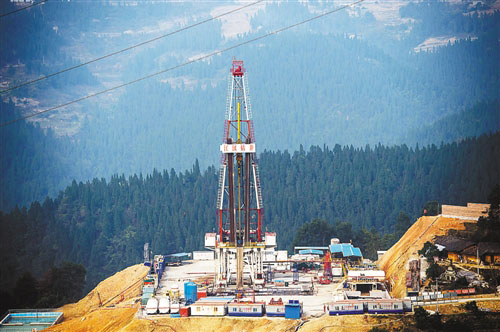
A Shale gas field in southwest of china
Concerns over import dependency force companies to search for other fuel sources
With their eyes on long-term diversification of domestic energy supplies, Chinese oil giants will maintain their shale gas exploration drive this year even as global crude prices have tumbled.
Affected by weakening demand from China, the world's second-largest oil consumer, and a glut in the global market, the spot price for West Texas Intermediate Crude plunged below $50 per barrel on Jan 5, the lowest since April 2009.
Another benchmark, Brent crude, fell to about $51 per barrel, a decline of more than 55 percent since June.
"The oil companies may reduce their investments in unconventional oil and gas exploration this year because the falling crude price makes imports more economical," he said.
However, Liu said that developing unconventional energy sources-especially shale gas-is mandatory in the long term, considering China's growing dependency on imports. The nation gets up to 60 percent of its oil from imports.
Another factor is the government's determination to increase clean fuel's role in the energy mix.
Melissa Stark, managing director of consultancy Accenture Plc's new energy business, said traditional major crude producers such as Mexico do not have any incentive to explore unconventional energy sources like shale gas due to their low economic growth rates and rich oil reserves.
But China is different because of its growing domestic demand.
"Some traditional crude producers in the Middle East are looking at alternative energy sources or making their crude more valuable by extending industrial chains," she said.
"Facing growing demand and imports of crude oil, China must develop shale gas as a national strategy for long-term benefits, considering its huge reserves."
Yue Laiqun, a researcher with the Ministry of Land and Resources, said: "Compared with large enterprises, private companies should pay more heed to the high risks of shale gas development."
He said that large, State-owned energy companies possess the capital, technology and human resources that the private ones lack.
Private energy companies' enthusiasm for shale projects has waned in the past two years.
During the first and second rounds of China's shale gas block auctions in 2012, there was a lot of enthusiasm among private companies that saw huge potential in the industry, boosted by government support and subsidies.
However, the president of a private oil company who declined to be identified said that his company will not join the third round of shale gas block auctions, which will be held soon. "The crude price fall is a big factor and shale gas is not attractive for us anymore" he said.
Adapting to shrinking price
ConocoPhillips Co: plans to cut capital expenditure by 20 percent to $13.5 billion, cut spending on upstream exploration by 23 percent to $5 billion in 2015
BP PLc: plans to cut capital expenditure by $1 billion to $2 billion in 2015 and cut thousands of jobs worldwide
Petroleum Nasional Bhd (Malaysian state oil company): plans to cut capital expenditure by 15 percent to 20 percent in 2015
Continental Resources Inc: plans to cut capital expenditure by 11.5 percent to $4.6 billion in 2015
EOG Resources Inc: will divest oil and gas assets in Canada and reduce staff
Exxon Mobil Corp: has said it can "survive the market" with an oil price as low as $40 a barrel
Chevron Corp: said that declining oil prices "will not affect its investments in Mexico, and the company plans to increase the number of drilling wells in Argentina".
China Petroleum& Chemical Corp (Sinopec): will maintain investment in shale gas drilling
Crude imports hit a high in Dec
China's crude imports surged to a record in December after a buying spree in Singapore by a State-owned trader and as the government in Beijing accelerated stockpiling amid the collapse in global oil prices.
Overseas purchases increased to 30.4 million metric tons last month, according to preliminary data released by the General Administration of Customs on Tuesday. That is about 7.19 million barrels a day, up from the previous high of 6.81 million in April. For 2014, crude imports rose to 310 million tons, also an all-time high.
Chinese demand is shoring up the global oil market as the country expands emergency stockpiles amid crude's slump to the lowest level in more than five years. The Asian nation's consumption is forecast to climb by 5 percent in 2015, while the government is set to hoard about 7 million tons of crude in strategic reserves by the middle of this year, predicts ICIS-C1 Energy, a Shanghai-based commodities researcher.
"Those record cargoes bought by China oil in October seemed to have been unloaded and helping imports shoot to a record," Amy Sun, an ICIS analyst in Guangzhou, said by phone.
"Meanwhile the government is taking advantage of low prices to stockpile both commercial and strategic oil."